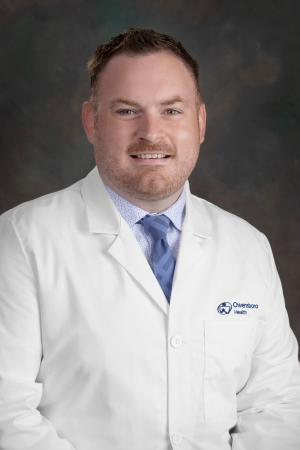Published on May 29, 2025
Aging Gracefully in 2025
By Dr. Andrew Collins

As our population continues to age, the need for comprehensive geriatric care becomes ever more crucial. Tailoring medical attention to the unique needs of older adults involves focusing on the "4 M’s": What Matters Most, Mentation, Medication and Mobility. Understanding and implementing these four pillars can significantly enhance the quality of life for seniors. At Owensboro health, we place an emphasis on improving the region’s geriatric care by focusing on this model of geriatric care.
At the heart of geriatric care lies the principle of prioritizing what matters most to each individual. This is about understanding the personal values, preferences and goals of older adults regarding their health care. Engaging in advanced care planning allows patients to articulate their wishes concerning end-of-life decisions, treatment options and other health-related choices.
Advanced care planning is an essential component of empowering older adults to make informed choices about their healthcare. Planning ensures that their wishes are respected and helps mitigate the emotional distress that families can experience with making decisions on behalf of their loved ones. By initiating conversations about what truly matters to them, healthcare providers can tailor treatment plans that align with the patients' values, ultimately leading to improved satisfaction and quality of care.
Mentation refers to the cognitive abilities of older adults, which can significantly impact their overall well-being. Cognitive decline, including dementia and other related disorders, is common in aging populations and can drastically affect daily functioning, independence and overall quality of life.
By focusing on mentation, healthcare providers can identify cognitive impairments early, allowing for appropriate interventions and support systems to be established. Moreover, cognitive health is closely linked to emotional well-being. Addressing issues related to memory and cognition can improve isolation, anxiety, and depression among older adults. Activities that promote mental engagement, such as puzzles, reading or socialization are imperative to a holistic approach to maintaining mental agility and emotional resilience.
Polypharmacy, the simultaneous use of multiple medications, is a growing concern in geriatric care. Older adults are at greater risk of experiencing adverse side effects and interactions due to the complexity and changes in our bodies as we age. Therefore, careful medication management is vital for ensuring patient safety and enhancing their overall health outcomes.
The emphasis on medication management includes regular reviews of a patient’s medication regimen to identify unnecessary prescriptions, reduce dosages, or explore non-pharmacological alternatives when appropriate. This approach minimizes the risk of adverse drug reactions, improves medication adherence, and alleviates issues related to dizziness, confusion and falls. This is why we have started the regions first polypharmacy clinic to help ensure our older adults have access to pharmacists and geriatricians with a passion to help elevate prescription burden. By rationalizing medications, healthcare providers can also enhance the effectiveness of treatments, reduce healthcare costs and ultimately improve the patient’s quality of life.
Mobility is a critical component of healthy aging. Maintaining physical capability allows older adults to preserve independence and perform daily activities that enhance their quality of life. Regular exercise is essential for cardiovascular health, muscle strength, flexibility and balance, all of which can diminish with age. With the help of the dedicated team at the Health Park we are able to craft programs and classes to help address the growing mobility needs of our aging population.
Encouraging older adults to engage in daily physical activities—whether it’s walking, stretching, or participating in group exercise classes—can improve not only their physical health but also their mental well-being. Exercise has been shown to reduce symptoms of anxiety and depression, promote better sleep, improve social isolation and enhance cognitive function.
The 4 M’s of geriatric care—What Matters Most, Mentation, Medication and Mobility—offer a comprehensive framework for improving the health and quality of life of older adults. By focusing on these key areas, healthcare providers can implement personalized, effective strategies that empower seniors to lead more fulfilling lives.
Dr. Andrew Collins is an Owensboro Health primary care physician who specializes in caring for our aging population.
About Owensboro Health
Owensboro Health is a nonprofit health system with a mission to heal the sick and to improve the health of the communities it serves in Kentucky and Indiana. The system includes Owensboro Health Regional Hospital, nationally recognized for design, architecture and engineering; Owensboro Health Muhlenberg Community Hospital; Owensboro Health Twin Lakes Medical Center; the Owensboro Health Medical Group comprised of over 350 providers at more than 30 locations; four outpatient Healthplex facilities, a certified medical fitness facility, the Healthpark; a weight management program, and the Mitchell Memorial Cancer Center.
On average each year, we have more than 19,000 inpatient admissions, deliver 2,000 babies and provide the region’s only Level III NICU. Owensboro Health physicians perform nearly 33,000 surgical procedures, including nearly 150 open-heart surgeries. Our physicians and staff have 90,000 Emergency Department visits and more than 1.25 million outpatient visits annually. Visit our home page for more information.